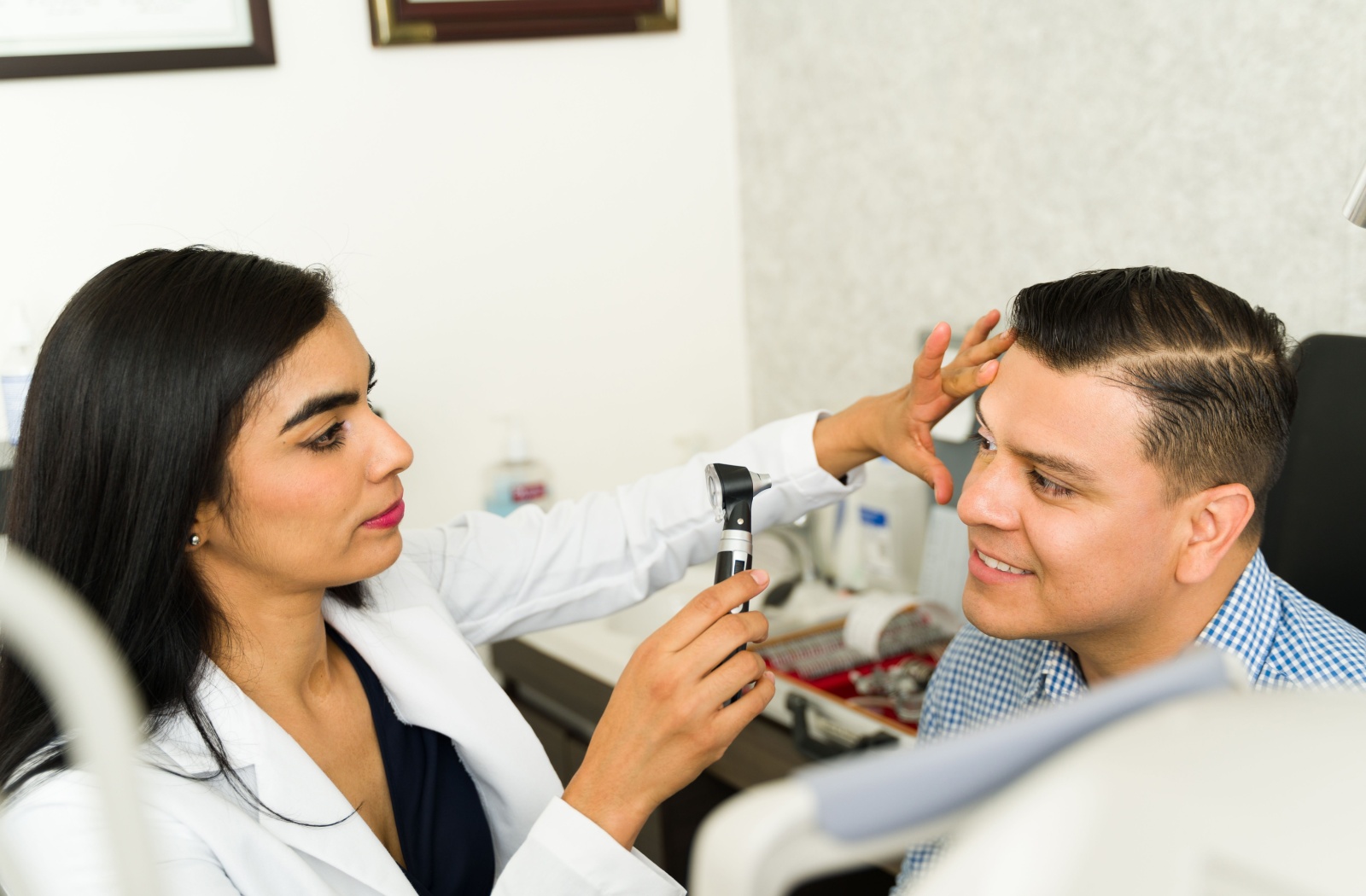Sinus infections can cause uncomfortable symptoms—congestion, facial pressure, or persistent headaches—but many people don’t realize how closely sinus issues are connected to the eyes.
Because your sinuses are located around, behind, and under your eyes, it’s not unusual for a sinus infection to lead to blurry vision, eye pressure, tearing, or even swelling.
But it’s important to know when these symptoms are part of a sinus issue—and when they might be something more serious. When you experience any changes in your vision or discomfort around the eyes, your optometrist can help you identify the cause.
What Are the Sinuses?
Your sinuses are a network of hollow, air-filled cavities located in the bones of your skull. They connect to your nasal passages and help filter, humidify, and warm the air you breathe.
Your sinuses are lined with mucous membranes that trap dust, bacteria, and other particles before they reach your lungs.
There are 4 main types of sinuses, each named for their location:
- Maxillary sinuses are beneath the eyes, near the cheeks
- Frontal sinuses are above the eyes, near the forehead
- Ethmoid sinuses are between the eyes, behind the bridge of the nose
- Sphenoid sinuses are deeper in the skull, behind the eyes
Despite their different positions, all of your sinuses play a similar role. Because they sit so close to your eyes, issues in the sinuses can sometimes affect your vision or eye comfort.
What Is Sinusitis?
Sinusitis is the medical term for a sinus infection. It occurs when the mucous membranes lining the sinuses become inflamed, usually due to a viral or bacterial infection.
The inflammation can block normal mucus drainage, leading to pressure, congestion, and mucus buildup in the sinus cavities.
Common causes of sinusitis include:
- Viral infections (like the common cold)
- Bacterial exposure
- Allergies
- Fungal infections
- Environmental irritants like smoke or pollution
As the infection progresses, mucus production increases to flush out harmful particles. The once-hollow cavities fill up, causing nasal congestion and pressure that can radiate to the eyes and forehead.

Recognizing the Symptoms of a Sinus Infection
Most people notice congestion first, along with a feeling of fullness or pressure in the face. Other signs of a sinus infection include:
- Thick, yellow or green mucus
- Facial pain or tenderness, especially around the cheeks, forehead, or eyes
- Postnasal drip (mucus draining down the throat) or an irritated throat
- Reduced sense of smell or taste
- Bad breath
- Headaches
- Low-grade fever
Because of the sinuses’ close proximity to the eyes, some people also experience eye pressure, watering, or general discomfort around the eye sockets.
Can a Sinus Infection Affect Your Eyes?
Yes—a sinus infection can absolutely affect your eyes. The sinuses are tightly packed around the eye sockets, particularly the ethmoid and sphenoid sinuses, located behind and between the eyes.
When these sinuses become inflamed, they can:
- Put pressure on the eyes, leading to a feeling of fullness or severe discomfort
- Cause swelling in the eyelids or surrounding tissues
- Trigger tear production, resulting in watery eyes
- Affect the optic nerve, leading to blurry or double vision in more severe cases
In some situations, the immune response to a sinus infection can create redness or sensitivity around the eyes. While these symptoms are usually temporary, you should always consider changes to your vision seriously.
When Should You Be Concerned?
Most sinus infections are mild and clear up within a few weeks. However, chronic sinusitis can last more than 12 weeks.
You should seek immediate attention if you notice:
- Sudden or worsening blurry vision
- Double vision
- Significant swelling or redness around the eyes
- Difficulty moving your eyes or pain when moving them
- A sense of pressure behind one eye that’s different from the other
- Fever that doesn’t go away, especially when paired with visual symptoms
These may be signs that the infection is affecting the structures around the eyes or that a different condition is present. Getting professional help can also help prevent a longer recovery.
Managing a Sinus Infection
Early treatment from your family physician can help reduce symptoms and prevent complications when you’re dealing with a sinus infection. Common home and medical remedies include:
- Saline nasal sprays to flush out irritants & moisturize your nasal passages
- Nasal decongestants (used short-term) to reduce swelling
- Warm compresses applied to the cheeks & forehead to relieve pressure
- Humidifiers to moisten the air & help break up mucus
- Antibiotics, if the infection is determined to be bacterial (prescribed by a doctor)
When symptoms persist for more than 10 days or worsen after initially improving, your healthcare provider may recommend additional testing or treatment.
The Role of Your Optometrist
While optometrists don’t treat sinus infections, they can help rule out or identify eye-related complications associated with them.
If you’re experiencing the following symptoms, it’s a good idea to schedule an eye exam or visit an optometrist for emergency eye care:
- Eye pain or swelling
- Blurry or double vision
- Unexplained tearing
- Sensitivity to light
In some cases, sinus-related symptoms can mimic other eye conditions, including conjunctivitis (pink eye), dry eye, or orbital cellulitis. By consulting an eye doctor, you can receive the appropriate treatment for your condition.
Prioritize Your Eye Health at Discover Eyecare
Sinus infections are common, but don’t ignore symptoms that affect your vision or eye comfort—you deserve to feel better.
When you’re experiencing facial pressure and blurry vision, it’s essential to monitor your symptoms and consult a medical professional or optometrist as needed.
At Discover Eyecare, we’re here to support your vision and overall eye health. If you’re experiencing changes in your eyesight, our team in Abbotsford and Chilliwack is ready to help. Book an appointment today.



